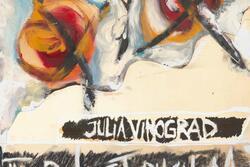Q & A with Poet and Translator Mildred Faintly
JWA talks to Mildred Faintly,about her recently published translation of Else Lasker-Schüler's book of poetry, Styx.
JWA: What led you to become a translator?
Mildred Faintly: My impatience with bad translations. I was tantalized by the genius I could see glimmering through them and wanted to set it free into English.
JWA: What was it about Styx that inspired you to translate it?
MF: Styx is a truly psychedelic book, with a wild invention and rainbow-colored mysticism that reminded me of Peter Max posters and the Sgt. Pepper album. Blake said, “Exuberance is beauty.” By that definition, this is one of the most beautiful books of poetry.
Since I’ve mentioned Blake and Peter Max, it might be fun, if a little pert, to note that the Sgt. Pepper album [cover] was designed by an artist named Peter Blake.
JWA: What would you point to in the original version which required your deepest thought?
MF: This book didn’t require so much deep thought as deep feeling. Else experienced all of life, even suffering, with a child-like enthusiasm that was difficult to express. There really aren’t any precedents for this in English. Whitman has an energy to match hers, but not a woman’s depth of emotional resonance. Sexton and Plath have the sonority, but not the gladness. Else required a music I haven’t yet seen in English, which I had to try and create.
JWA: Is there something about the time period in which Else lived that draws you into the material?
MF: Else lived in Berlin before World War I. We tend to picture it all as the decadent Berlin of Cabaret, but this was when Berlin was still a relatively small town with a wild bohemia, like San Francisco in the early 1960s. It was so full of hope and idealism! You can see the mood of the time in the earliest Expressionist painters, like Kirchner and Nolde, who painted their friends skinny-dipping, in primary colors, with a naive simplicity influenced by folk art. It was a kind of hippie paradise—only they were reading Nietzsche instead of Castenada.
JWA: What was the process of translating Styx like?
MF: There is no more intimate experience of a writer’s work than that of translating it. You weigh every word, and hold it to the light to consider its emotional coloring. To encounter the great soul of Else Lasker-Schüler with this kind of immediacy was one of my life’s transforming experiences.
JWA: In what ways is Styx relevant for us at this time in history, as Jews, as women?
MF:Women’s voices are largely missing in pre-modern literature, a lack which is gradually being remedied, though nowhere near as quickly as one would wish. Women are only now discovering their own idiom, their own sensibility, their own poetics.
The first terrific stirrings of Jewish women’s literature begin with Rahel [Bluwstein], and her contemporaries Else Lasker-Schüler, Anna Margolin, and Mascha Kaléko. They offer anew all the insights and emphases that characterize Jewish genius—moral warmth, ironic self-awareness, and unfaltering affirmation of life in this world. The modes of thought honed by the Hebrews for 3,000 years of uninterrupted literary culture are here writ large, by women, in the unrehearsed and urgent cursive of self-discovery.
JWA: How does this translation connect to themes in your other work?
MF: The whole focus of my work is to elevate the voices of women, by translating the greatest poetical work by the most brilliant women from every age and time my knowledge of languages gives me access to. The publication of Styx is my opening salvo. I am a transgender woman. Having had to fight to be a woman, I feel eligible to fight for women, and in that battle, making women audible comes first.
JWA: What new project(s) are you embarking on?
MF: I am completing an anthology of poetry by women from ancient China, which will have a few agreeable surprises. I will present women’s unacknowledged role in the development of written Chinese. The characters that depict woman and her activities show an insight into women’s feelings and predicaments that would be disingenuous to attribute to Bronze Age men. It will also set forth the female authorship of many of the compositions in the 2,000-year-old collection of folk songs, The Classic of Poetry, which continues to be attributed to men exclusively, despite the universally known participation of women in such disregarded arts as weaving and folk music. Here too, the deeply felt expression of women’s feelings often makes male attribution preposterous. It is more than time these women’s voices were set free.
JWA: Finally, please share some of your favorite lines from Else Lasker-Schüler so that we can sense her incandescent spirit.
MF:
You played a passionate song,
I was afraid to ask what it was called
because I knew its name would say everything
that had flowed between us
slowly as molten lava.
(From “Fortissimo”, translated by Mildred Faintly)








